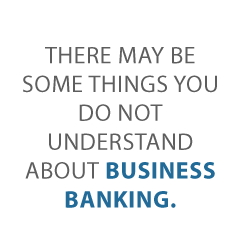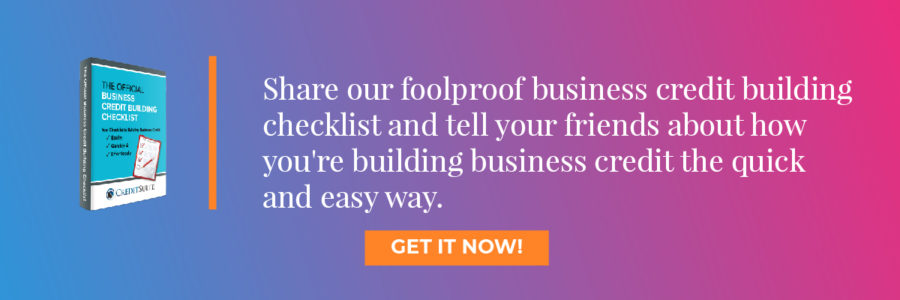There may be some things you do not understand about business banking. For example, a lot of businesses start out thinking they can just run their personal and business transactions through the same accounts. It often works well and is easier for small businesses just beginning. However, they soon realize that they need a business banking account, for several reasons.
3 Reasons Why Having a Business Banking Account Is Non-Negotiable; And 4 Options to Kick Off Your Search for the Best One
What are these reasons? Why does it matter if your business has a separate account or not? Here are 3 reasons why you need a business banking account.
Get our business credit building checklist and build business credit the fast and easy way.
Reason 1 Why You Need a Business Banking Account: Separation
For many reasons, your business needs to be an entity all its own. The more it is separated from the personal finances of the owner, the better. The two main reasons this is necessary include:
Tax purposes
To file your business taxes, you are going to have to separate business and personal expenses. If you have a dedicated business banking account, this is immensely easier. Otherwise, you have to pull out the shoebox full of receipts, and that can get cumbersome. Sure, there are easier ways to do it than shoebox filing, but none of them are easier than simply keeping business expenses separated in their own account to begin with.
Business Credit
You also need your business and personal finances separated for business credit purposes. The more connected your business transactions are to you personally, the more likely they are to show up on your personal credit report rather than your business credit report.
In addition to a business bank account, the following things are needed to ensure proper separation for business credit building.
Separate Contact Information
Make sure your business has its own phone number, fax number, and address. Of course, that doesn’t mean you have to get a separate phone line, or even a separate location. You can still run your business from your home or on your computer if you want. You don’t even have to have a fax machine.
In fact, you can get a business phone number and fax number pretty easily that will work over the internet instead of phone lines. In addition, the phone number will forward to any phone you want it too so you can simply use your personal cell phone or landline if you want. Whenever someone calls your business number it will ring straight to you.
More About Separate Contact Information
Faxes can be sent to an online fax service, if anyone ever happens to actually fax you. This part may seem outdated, but it does help your business appear legitimate to lenders.
You can use a virtual office for a business address. How do you get a virtual office? What is that? It’s not what you may think. This is a business that offers a physical address for a fee, and sometimes they even offer mail service and live receptionist services. In addition, there are some that offer meeting spaces for those times you may need to meet a client or customer in person.
EIN
You need to get an EIN for your business. This is an identifying number for your business that works in a way similar to how your SSN works for you personally. Some business owners use their SSN for their business. However, not only does it look unprofessional, but it allows your business and personal transactions to get all mixed up because they are all attached to the same identifying number. To get the separation you need, an EIN is necessary. You can get one for free from the IRS.
Incorporate
Incorporating your business as an LLC, S-corp, or corporation is necessary for establishing a business as a separate entity from the owner. It also lends credence to the legitimacy of your business. As an added bonus, it comes with some protection from liability.
Which option you choose does not matter as much for fundability as it does for your budget and needs for liability protection. The best thing to do is talk to your attorney or a tax professional. What is going to happen is that you are going to lose the time in business that you have. When you incorporate, you become a new entity. You basically have to start over. You’ll also lose any positive payment history you may have accumulated as well.
This is why you have to incorporate as soon as possible. Not only is it necessary for separation, but it affects your time in business. The longer you have been in business the more fundable you appear to be. That starts on the date of incorporation, regardless of when you actually started doing business.
Get our business credit building checklist and build business credit the fast and easy way.
Reason 2 Why You Need a Business Banking Account: Merchant Account
Okay, so having a business bank account aids in separating your business from yourself for business credit building, along with all the other factors mentioned above. While that is most definitely a big deal, it for sure isn’t the only reason you need one. Here’s another reason, and it’s a biggie.
If you do not have a business bank account, you can’t get a merchant account. Without a merchant account, you can’t accept credit card payments. Studies show that customers spend more when they can use a credit card. This makes sense when you think about it, because online sales are made mostly by credit cards. Accepting credit card payments captures impulse sales as well.
When you look at it this way, not having a business banking account, and thus being able to take credit card payments, can severely impact sales in a negative way.
Reason 3 Why You Need a Business Banking Account: More Funding Options
The third reason you need a business bank account is that is opens the door to more funding options. First, it increases fundability. This alone increases the funding options available to you, indirectly. However, there are some lenders and credit card companies that require a business banking account specifically in their requirements for approval.
For example, if you are working toward building business credit, you are going to need to work with starter vendors. These are vendors that will offer net 30 terms on accounts without checking your credit. Then they will report those payments to the business credit reporting agencies. This is basically the cornerstone of how to get started with business credit, because you can get credit without already having credit.
However, since they aren’t checking credit scores, they need to reduce risk in other ways. One of those ways for some is looking for a minimum average balance in a business bank account. If you do not have an account at all, it will be much harder to get this type of vendor credit.
Business Banking Account: A Word About Your Bank Score
You bank score is not the same thing as your credit score. It is basically a score assigned to you by your bank. It helps them determine if they should let you open an account. The sad fact is, if you are not able to open a personal account, the chances are high you will not be allowed to open a business bank account. One thing some banks do is check with agencies such as ChexSystems, Early Warning Systems, and Telecheck to see what your report from them says. As ChexSystems is the most common, let’s take a closer look at them. The others work in a similar way.
Per the ChexSystems website, they are, “a nationwide specialty consumer reporting agency under the federal Fair Credit Reporting Act (FCRA). ChexSystems’ clients regularly contribute information on closed checking and savings accounts.”
In addition, they say, “ChexSystems provides services to financial institutions and other types of companies that have a permissible purpose under the FCRA. ChexSystems’ services primarily assist its clients in assessing the risk of opening new accounts.”
Details About ChexSystems
Other things noted about ChexSystems on their site include,
- “ChexSystems is not a collection agency.
- Also, “ChexSystems will never contact a consumer as part of an effort to collect a debt, and does not make unsolicited calls to consumers.”
- And “ChexSystems will never require payment from a consumer in order to investigate the accuracy of consumer reporting information, nor will it ever require payment in order to remove inaccurate consumer reporting information.”
More About ChexSystems
That still leaves a lot of unanswered questions. As mentioned above, some banks will use reports from them to help determine if they should let you open an account. On occasion, lenders will use them to help determine fundability as well. They report on insufficient funds, closed accounts, and overdrafts. If these things are present in large numbers, it could affect your ability to get a bank account. This would affect your fundability.
Most people don’t even know that ChexSystems is a thing. That is of course, until they’re turned down for a loan or cannot open an account. Find out what to do if this happens to you and get out of ChexSystems jail.
Get our business credit building checklist and build business credit the fast and easy way.
Business Banking Account: Best to Start from the Beginning
It stands to reason that it would be easier to open a business banking account from the very beginning. Still, most business owners do not know how important it is. It seems easier at the time to just use an already existing personal account. Then, before they know it, the need a business bank account becomes obvious. At that point, they have a lot of work to do to sort things out.
The hassle of separating business from personal transactions grows as your business does. You have to change any auto drafts. You need to make sure all information is updated with all vendors and on all documents. There are any number of things that have to be done to change over to a new bank account. Furthermore, if it is the middle of the year, you will have to do some major quilt work when it is time to do the taxes. Long story short, the sooner you open your business bank account, the better.
Business Banking Accounts: Best Options to Get Started
Not all business banking accounts are created equal. Some work better for new businesses than others. Also, some have better rewards and incentives than others. Here are a few to look at to get your started, but be sure to take a look around at all the different accounts available.
Chase
The Chase free business checking account has one of the lowest minimum balance requirements available at $1,500. Up to 100 transactions are free each month. In addition, you get unlimited electronic deposits for free. The minimum amount required to open the account is $25, but if you open it with less than the $1,500 minimum balance requirement you will have to pay the $15 monthly fee until you reach the minimum balance.
Bank of America
The minimum balance for the Bank of America free business checking account is a little higher at $3,000. You get up to 200 free transactions per month.
Axos
There is no minimum balance requirement for this free business checking account. The minimum initial deposit requirement for Axos is $1,000. Also, you get up to 200 transactions free per month. As an added bonus, there is unlimited ATM fee reimbursement.
This account operates online only. There are no branches to visit.
Azlo
Another online only free business checking account, Azlo has no minimum opening deposit or minimum balance. There is no ATM fee at BBV or Allpoint ATMs. In addition, there are no paper statement, incoming wire, or stop payment fees.
Having a Business Banking Account is More Important than You May Think
Most business owners do not realize just how important a business bank account is to their business. As you can see, however, it is very important indeed. By having this information upfront, you can be way ahead of the game. Whatever season your business is in, today is the day to open a business bank account. Whether you go with a bank you already have a relationship with, or one of the options above, it’s important to take this step now, rather than later.
The post Business Banking Account: Why You Need One and How to Get One appeared first on Credit Suite.



